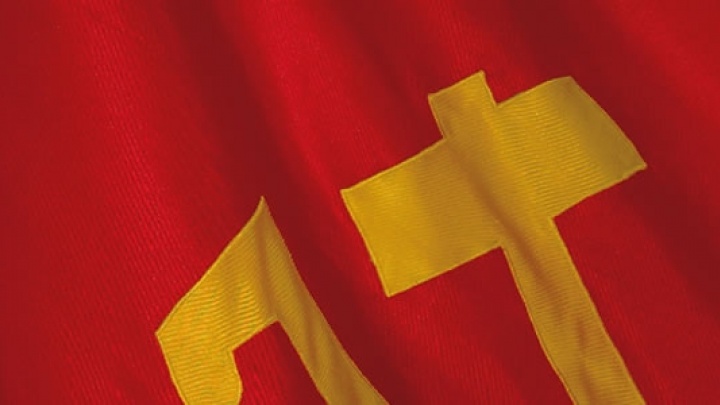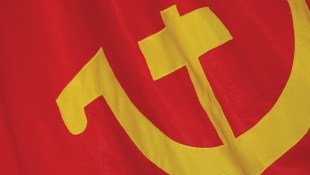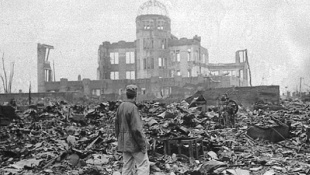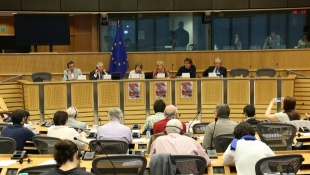International Communist Seminar - (Brussels, 27-29 June 2014) - Contribution of the Portuguese Communist Party
Comrades
1. We thank the Workers’ Party of Belgium for the invitation and fraternal welcome.
The theme of this Seminar, which meets the lines of joint action adopted at the 15th Meeting of Communist and Workers’ Parties held in Lisbon, is very timely,
2. The combat against imperialism and its biggest monsters, fascism and war, is on the agenda as a fundamental task of the communist parties and other revolutionary forces.
Big business, with its most reactionary and aggressive sectors, openly terrorist, in an increasingly clear and disturbingly blatant way bets on fascism and war as a solution to the crisis of over-production and over-accumulation which, in the context of the deepening structural crisis of capitalism, drags on with no end in sight. It acts to smother the growing resistance of the workers and peoples against the violent exploitation and national oppression they suffer and to impose a massive devaluation of labour and a social regression of a civilizational dimension so as to counter the relentless action of the law of the tendency of the profit rate to fall. The blatant support of the U.S. and the European Union to the fascist coup in the Ukraine and the advance, sponsored by Capital and its media, of populist, xenophobic and extreme right-wing forces in Europe, some admittedly Nazi, constitutes a serious cause for alarm and requires the mobilisation of the democratic and progressive forces.
3. History does not repeat itself. Hundred years after the outbreak of World War I, in an irregular and bumpy process, of advances and drawbacks, of major revolutionary breakthroughs but also of tragic defeats, the situation in Europe and the world has undergone profound changes.
Witness the epic early developments of socialist societies, the cases where they continue or when defeated, the deep marks they left. Or spread to the entire globe of Marxism-Leninism. Or the liquidation of colonial empires (the last being Portuguese), the emergence of about a hundred new independent countries, in a huge redrawing of the economic and political map of the world and the complex realignment of forces resulting from this. Or the huge scientific and technical progress they brought.
But capitalism, contrary to what the communist movement came to assume, never ceased to be economically and ideologically dominant and the defeats of socialism in the USSR and Eastern Europe, after decades in which imperialism had to face a powerful socialist camp which held back its aggressive impulses and prevented the outbreak of a new world war, the world was again dangerously exposed to the consequences of its exploitative and aggressive nature (which has not changed) and the dynamics of its contradictions.
While the capitalist system exists (and remains hegemonic) wars of aggression against sovereign countries and peoples will continue with the real possibility of their developing into conflicts of greater proportions and even a new world war that, with the weapons existing today, would be even bloodier and more devastating than the wars of 1914/18 or 1939/45, and could even mean the annihilation of Humanity.
But this does not mean that such a war is inevitable and that it is not possible to gather forces and create circumstances to bind the criminal hand of imperialism. This is an objective that the Communists can never give up.
History is not written beforehand and knows no fatalism. It is the working masses, with their organisation and struggle that write the final ending.
4. Armed with the Leninist analysis of imperialism, the communists have to be vigilant and mobilised for hard struggles. They have to denounce and fight fascism, militarism and war. Lead the fight in defence of the independence and national sovereignty of their countries. Develop solidarity with the people subject to imperialist interference and aggression. Reject and fight the eternal attempts by the ruling class to channel opposition to the war into an inconsequential pacifism or nationalist reaction. Be prepared to answer all circumstances that arise, including the possibility of the outbreak of a war leading to the creation of a revolutionary situation.
At the same time it is necessary to carefully observe the gigantic process of realignment of forces which, following the relative decline of the U.S., is taking place on a global scale, a contradictory process that meanwhile contains a strong component of resistance against a global recolonization process and acts as restraining factor against the establishment of the totalitarian "new world order" hegemonized by U.S. imperialism and directed against the workers and the peoples. The hostile escalade of the U.S. in relation to China, considered a "strategic adversary", and even in relation to Russia, is the expression of this reality, a reality although contradictory, the revolutionary forces cannot fail to take into consideration in their struggle against fascism, militarism and war.
Meanwhile the task is to build a broad movement for disarmament and peace, along the lines of the best traditions of the labour movement - which never abandoned the banner of the struggle against war - valuing and broadening the unified action of the World Peace Council. A movement which, focused on popular enlightenment and mobilization, objectively acquires an anti-imperialist character widening the camp of those who become aware that the struggle against war requires tackling the causes that are at the root of the system of capitalist exploitation. PCP’s experience in Portugal, always at the forefront of the struggle for peace and in particular for the end of the criminal colonial wars, is that this is a key component of action and project of a revolutionary transformation of society. It is not narrowing but enlarging the social and political base of the peace movement that strengthens the struggle for profound social changes and for socialism. In PCP’s concept, the struggle for peace and the struggle for social progress and for socialism have always been and remain inseparable.
5. The evolution of capitalism in the last hundred years has confirmed Lenin’s analyses and predictions in his famous work "Imperialism, the highest stage of capitalism." The global expansion of capitalist relations, the unprecedented centralization and concentration of capital, the overwhelming dominance of finance capital, the commoditisation of all spheres of social life, the increasingly speculative, rentist and parasitic nature of the system, the growing weight of corruption and criminal trafficking, are striking features of contemporary capitalism. The sharpening of contradictions between capital and labour and between socialized production and private appropriation, and the action of the laws of uneven development of capitalism and of the tendency of the profit rate to fall, are realities that confirm the validity of the basic laws of Marxist economics.
But contrary to what certain theories about the so called "capitalist globalization" intend, the formation of powerful conglomerates that operate across State borders and dividing among themselves the biggest slices of the world market, the creation of international and supranational structures of articulation does not render inoperative the national space/state as the watershed of the class struggle and of social transformation nor undoes inter-imperialist contradictions.
It is no coincidence that the so-called movements of "alter-globalization" that challenged the role of the revolutionary parties and the class-oriented trade union movement, have virtually disappeared from the scene. Or that the far right tries to instrumentalize the oppressed feelings offended by supranational impositions of the European Union (as was evident in the recent elections to the European Parliament) and grab from the working class the banner of national interest and sovereignty, at a time when the bourgeoisie has definitely abandoned it.
As the Portuguese Revolution has shown - a Revolution that PCP’s Programme defined as national and democratic and confirmed in practice in its fundamental lines - and the current struggle to make a rupture with over 37 years of right-wing policies shows, class and national tasks are inseparable. The struggle to defend the independence and sovereignty of Portugal, and in particular the struggle against NATO and the European Union of big business and of major powers, constitutes a direct contribution to the overall struggle of the workers and peoples of the world against imperialism. In the communist identity of the PCP, a party that defines itself (and is in practice) as the "vanguard of the working class and of all working people," patriotism and internationalism are inseparable.
Moreover, the internationalization of capital and the increasing centralization and fusion of economic power and political power does not eliminate contradictions between the different poles of imperialism. In the binomium concertation-rivalry between the great powers and major economic and financial potentates, what predominates is an imperialist concertation, of class, against workers and against the peoples, to intensify the exploitation of paid labour and re-colonise the planet. But the contradictions are present, tend to escalate with the crisis, and can lead to conflicts of major proportions. This is a real danger of the present times.
6. These are, comrades, some issues that we wish to highlight in this short contribution.
The very unstable and uncertain international situation is fraught with dangers. In broad terms, imperialism continues on the offensive and the times are still of resistance and gathering of forces.
But great dangers coexist with great potential for progressive and even revolutionary developments. The difficulties, the contradictions, the crisis that capitalism is plunged in and, above all, the growing struggle of the workers and peoples of the whole world can prevent the onset of another world war. And, despite the lagging behind of the subjective factor that we still find, we should not lose sight that we live in times, that the October Socialist Revolution ushered, in transition from capitalism to socialism, a reality that the Portuguese Democratic and National Revolution proved, of following in its ascending phase, the path of socialism, as still remains in the preamble of the Constitution of the Republic, and whose defence constitutes the main task of the communists and all Portuguese democrats and patriots.
To the PCP, the conclusion is obvious. In the framework of a wide variety of situations in each country (national characteristics, stage of the revolution, immediate tasks, etc.) the main task is the strengthening the communist parties with its roots in the working class and in the national reality of their countries and strengthening their internationalist cooperation. And together with the strengthening of the communist and revolutionary movement, the strengthening of the anti-imperialist front.
This Seminar organised by the comrades of the Workers’ Party of Belgium – whom we would like to salute for the great progress achieved in the May 25 elections – in on the right track.
Thank you, comrades.



